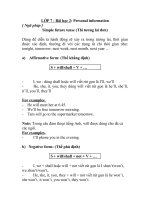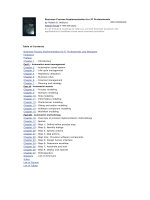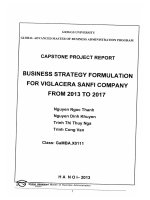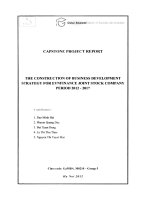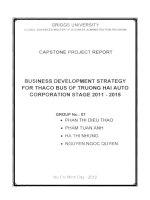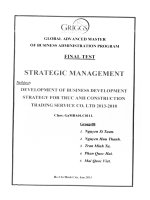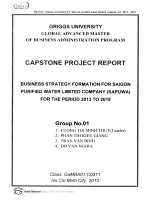Business Ethics note for 2 assignments
Bạn đang xem bản rút gọn của tài liệu. Xem và tải ngay bản đầy đủ của tài liệu tại đây (140.07 KB, 17 trang )
Ethics and social responsibility is an integral part of running the business.
However, the fact is that many businesses only concentrate on maximizing profit
regardless of business ethics. Today, I would like to analyze the business operation
of Vedan for the purpose of emphasizing the importance and practicality of
operating business ethically. First of all, we need basic understanding of what the
business ethics is. Business Ethics is the study of business situations, activities, and
decisions where issues of right or wrong are addressed. In order to identify the
rightness and wrongness of particular company’s activities, we should base on
ethical theories.
Outcome 1.1: Explain the background and development of theoretical ethical
approaches
There are many approaches of ethical theory such as: Egoism, Utilitarianism,
ethics of duties, rights and justice. These theories generally can be differentiated
into 2 groups: non-consequentialist theories and consequentialist theories.
However, I just focus on 2 main approaches: Utilitarianism and Ethics of duty
Categorical imperative to understand deeply the contrast between consequentialist
and non-consequentialist theories
1. Utilitarianism
Utilitarianism is modified by John Stuart Mill (1806 – 1873) - a British
philosopher. According to utilitarianism, the action can be judged as good or bad
on the basis of its consequences.
- An action is morally right if it results in the greatest amount of good for the
greatest amount of people affected by the action. It means that do the most good
for the most people
- When an action affects the majority adversely, it is morally wrong.
2. Categorical Imperative
Categorical imperative is developed by Immanuel Kant (1724 – 1804) - German
philosopher. Kant argued that the ends do not justify the means of an action - the
right thing must be done, even if doing the wrong thing would do the most good to
most people. It means that Right is right and wrong is wrong, no matter what
the consequences are
Actually, Kant theory is quite similar to absolute ethics and Mill is likely a
representative of relative ethics.
Outcome 1.2: Compare and contrast absolute and relative ethics
And in order to understand clearly about this, we move to next part: compare and
contrast absolute and relative ethics.
Absolute ethics
Relative ethics
Similarities The standard to determine rightness and wrongness of action
Differences With absolute ethics, Rules
While with relative ethics Judgment of
are consistent and universal. . right or wrong depends on different
For absolute ethics, A
situation
In contrast, for relative ethics Nothing is
situation is always right or
inherently right or wrong, ethics is just
always wrong, whatever
to give some advantage (social,
results or reasons.
Absolute ethics Apply for
economic,…)
Whereas, with relative ethics Each
every situation in the same
situation has different way to apply
way
Absolute is Objective sense
(depends on culture, races, religion,..)
In contrast, relative is Subjective sense
For example: Kill 1 patient to save the other 5 patients who are waiting for lifesaving transplants. If not, all 6 patients will die.
For absolute ethics, killing is always wrong, whatever the circumstances (everyone
has right to live). In contrast, for relative ethics, kill 1 patient to save 5 is the best
choices for this situation (do the most good for the most people)
Development
Virtue ethics (đạo đức tốt): Moral characters
Ethical approaches based on character and integrity
The foundation of the virtuous character is the first step towards morally correct
behavior.
Feminist ethics (sự bình đẳng): Care for others and relationship
Feminist ethics is an approach that prioritizes empathy, harmonious and healthy
social relationships, care for one another, avoidance of harm above abstract
principles.
Outcome 1.3: Explain the ethical issues which can affect the operational
activities of a business
Vedan Vietnam is a MSG (monosodium glutamate) plant. It was established in
1991, located in Dong Nai Province
Ethical issue:
According to The Ministry of Natural Resources and Environment, Vedan Vietnam
discharged 110,000cu.m (Cubic meter) of untreated wastewater directly into the
Thi Vai river every month, this contributed 82.9% to the population of Thi Vai
river.
which caused serious impacts to both the environment (pollution in soil, air and
water of surrounding area. The toxic water killed local farmers’ fish and shrimp
and ruined farmland) and nearby community (water in many wells in the area is
polluted seriously which directly caused the ill-effects on the local residents’
health such as skin rashes, respiratory diseases and headaches).
The reasons of dumping sewage directly into environment is that Vedan can cut
down the cost of waste-processing which requires complicated stages, specialized
techniques and high cost as well.
Impacts to operations of Vedan Vietnam
Vedan has suffered some consequences
The first
1. Reaction from external stakeholders:
Vedan face a lot of complaint letters of resident about violations of environment
protection laws which influence on Vietnam government’s decision about
suspending Vedan’s license and impose administrative penalty against Vedan’s law
infringement
The second
2. Financial damages
Vedan must pay fine and environmental fee, compensation for farmer, the cost of
restoring Thi Vai River as well as decline the revenue (because Vedan operation is
interrupted for a long time, and losing a lot of customers. Customer can not trust
Vedan as before, some market even boycotted Vedan products)
The third reduce reputation of Vedan
3. Decreasing company reputation: Reduce shareholder’s belief and customer
loyalty, Company face decreasing the number of shareholder and losing customers
which lead to decrease stock price and sales.
Outcome 2.1: Impacts on objectives of Vedan Vietnam Objectives of Vedan “As
a foreign-invested company in Vietnam, apart from business objectives, Vedan
Vietnam also pursues the purpose of making a positive contribution to
socioeconomic development of Vietnam” (An, 2013).
As analyzed above, it is easy to recognize that Vedan only focused on economic
responsibilities. Vedan just wants to maximize profit to satisfy shareholders and do
not care about the rest of responsibilities in CSR. Because of maximizing profits,
Vedan did the unethical action. Ethical issues lead to the objectives “operating with
purposes of making a positive contribution to socioeconomic development of
Vietnam” becoming unattainable and led to some consequences which I mention
above.
Outcome 2.2: Finally I move to the part the implications for a business and its
stakeholder In case of Vedan, there are conflict happening between customer and
shareholder
Customer want lower prices while Shareholder wants to get more profit
Decision of Vedan: Cutting cost of waste-processing which require specialized
technology and high cost
To reduce the cost of products and gain more profit to satisfy shareholders
However, By dumping wastewater directly into the river. Vedan face a lot of
problems and affect significantly on its stakeholders
Shareholder: are at risk of losing the amount of money invested into Vedan and
harm for local resident’s health, effect seriously on their life as well as has set
alarm bells ringing for Vietnam Government about the gap of controlling operation
of foreign-invested company in Vietnam
Lessons for Vedan:
- Changes wrong perspective is that running business ethically is only bring
benefits for society, not for corporation and awareness about the risk of unethical
business.
-. Realizing the link between running business ethically and increasing profit: A
business operation doesn't exist in a simply way of making money. It is put in a
close relationship of customers, and the local community.
So principles we need to remember when running business is that:
GOOD ETHICS IS GOOD BUSINESS
“NO ETHICS , NO BUSINESS ”
“ETHICAL BUSINESS IS PROFITABLE”
“ETHICAL BUSINESS GENERATESGOODWILL”
“UNETHICAL BUSINESS LEADS TO EXPLOITATION OF CONSUMERS AND
SOCIETY ATLARGE
Thank you for listening
This ethical issue have influence significantly on stakeholder of company such
as Vedan affected on health of local community of surrounding area. Pressure
group which represents for community does not agree with this actions. Therefore,
They influence on Vietnam government to make decision: suspending on license of
Vedan and compensate as responsibility for Vedan’s wrong actions
•
Normative ethics: Process of resolving conflicts
•
Postmodern ethics: Moral impulse and emotions
Normative ethics (tính cách quy chuẩn): Process of resolving conflicts
Normative ethics seek to provide action-guides; procedures for determining
a specific course of moral action.
• Postmodern ethics: Moral impulse and emotions
• It encourages individual actors to question everyday practices and rules, and
to listen to and follow their emotions, inner convictions, and “gut feelings”
about what they think is right or wrong in a particular situation.
•
•
Hello everyone, I’m Snow. As a chief ethics officer of
Snake Oil company, I would like to present about
“Research a current ethical issue”. My presentation
included 5 parts. Part 1 & 2 related to Apple company, 3
remaining parts are about my research company Sumidenso Vietnam
Part 1: The role of Apple acting as moral agent
Firstly, we must understand deeply about moral agent. A
moral agent is” anyone capacity of making ethical
decisions and putting them into action” (Mack, 2014). At
the first glance, the idea of moral agent is just
characteristics of humanity, not that of the company.
However, corporation is considered as a person in the
eyes of the law. A company make decisions through its
people. Moral considering is one of those decisions.
Acting as a moral agency means the company has right to
make decisions so they must have ability to understand
decisions that they make and accept to take responsibility
for their decision and its result.
In the case of Apple Inc, Apple has full power to make
decisions related to their
Decision of Apple: Apple choose China is where their
production factories are placed
Apple is aware deeply of their decisions. They make
Iphone in China, not America because it's a combination
of not only cheaper labor but better labor, better factories
and scale
According to the NY Times, Apple executives said that
the company's analysts had forecast it would take as long
as nine months to find that many qualified engineers in
the United States .But In China, it took 15 days (Chan,
2012)
Moreover, Apple still accept to take responsibility to
ensure "corrective actions" are taken when know that the
Foxconn Technology factory in China, where they
manufactures many of their products has been criticized
for ethics violations and socially irresponsible working
conditions such as Workers forced to stand until their legs
were swollen and they were unable to walk, although
Apple is not the only company manufacturing products in
Foxconn company as well as does not directly abuse
labor. Apple chief executive Tim Cook visited Foxconn's
Chinese factories said that “We believe that workers
everywhere have the right to a safe and fair work
environment, and promised regular inspections of
working conditions at its biggest suppliers"
It means that Apple can be a moral agent
In part 2 the development of mechanisms for achieving
employee involvement and empowerment I will answer
2 questions:
- What is employees involvement and empowerment?
- How Apple empowers its employees?
Firstly, Employees involvement is defined as “creating the
environment in which people have an impact on decisions
and
actions
that
affect
their
job”.
Employees
empowerment is Employee empowerment is creating a
working environment where an employee is allowed to
make his own decisions in specific work-related
situations.
The
biggest
difference
between
them
is
for
empowerment, employees have the right to make
decisions and they have to take responsibilities for the
risks in their decision. While involvement only has right
to contribute to the decision-making process and the
employer still have responsibility with the decision.
These 2 concepts have a little bit difference, but have the
same purposes: that is to motivate for employees with the
higher satisfaction.
In order to evaluate the important role of employee
involvement and empowerment, I made one questionnaire
with the participation of 50 respondents who are in
working age.
Question is “How is your assessment about the important
role of employee involvement and empowerment in
motivating employees’ contributions to the company?”
I accumulated the results as follows:
Very important 26 (52%)
Important 21 (42%)
So so 3 (6%)
Not important 0
From the chart here, It is easy to recognize that almost all
respondents evaluate highly important of employee
involvement and empowerment to company. Therefore,
the company should consider this aspect in running
business for contributing to its success.
In the case of Apple, Apple has great orientation from
CEO Steve Job. He believed that employees are the real
creators of value in any organization so he empowered
employees to innovate and solve problems. He said: “You
have to be run by ideas, not hierarchy. The best idea must
win, not the best person with the most power or seniority”
This value has helped the company to produce one
ground-breaking, beautiful product after another (Jain,
2013)
Part 3: Current ethical issue affecting Sumidenso
Vietnam
Sumidenso Vietnam Ltd is 100% subsidiary of Sumitomo
Wiring Systems Japan. The company is major in
manufacturing electric wires and electronic devices used
for electronics and automotive industry Specializing in
producing used in electronics and automobiles industry. It
was established in 2006 and located in Hai Duong
Province (thuongmai, 2011) Sumidenso Vietnam involved
in juvenile labor abuse scandal in 2012.
Sumidenso has 608 juvenile labors. In which 426 worker
had already signed labor contract with a term of 12
months. 182 workers had not signed labor contract yet
(still is in the training time).
The company applies the working time and rest time for
juvenile labour as a normal labor (working 8 hours/day,
44 hours/week, day off for Sundays and 2 Saturdays in 1
month). Company holds for juvenile labor work overtime,
work in the evening as well as underpayment of wages for
labour force which against regulations (HaiDuongNews,
2012).
This ethical issue effect on reputation and finance of
Sumidenso Vietnam. Sumidenso Vietnam lost reputation
because of acting unethical to gain short term benefit.
About Finance : Company Face administrative penalty
from government, with Low-skilled labor (lack of
experience), tired workers (working overtime) lead to
appearance of defective products, poor quality product
face risks of product recall
In general, this ethical issue cause Sumideso reduce
customers and profitability
Part 4: The way to improve the ethics whilst meeting
objectives and ensuring good employer/employee
relationships
Sumidenso’s objectives: Growth of personnel will be
9,500 people and revenues would be $400 million at the
end of 2015. (haiquanonline, 2011)
The way to improve the ethics:
- Sumidenso could implement some solutions as follows:
•
Arranging for juvenile labor to work in production
line which is safe and suitable for their health as well
as apply working time (42 hours/week)
Conducting re-signed labor contract with juvenile
•
workers and commit to pay wages in accordance with
the provision of the labor law.
It helps Sumidenso achieve employees satisfaction and
attract human resources
- Sumidenso should apply Six Sigma or Lean as the
Quality Management Scheme
•
Six Sigma: It focuses on reducing variation and
errors by using of in-depth analysis tools in order to
improve the process. Using juvenile workers with
low skilled that Sumidenso faced many difficulties in
the production process.
If Sumidenso apply this method and achieve
higher Sigma level means cost of poor quality that is
reduced
•
Lean: It aims to reduce and remove the waste (in
time, money, human …) Sumidenso can
- Eliminate waste by improving the technology in
manufacturing processes
- Raise employee involve by providing training
opportunities
Leans help Sumidenso to increase productivity so
company can achieve objectives without ethics
violations such as force juvenile worker work
overtime.
Part 5: Design a suitable ethical code
In this part I will suggest Sumidenso should apply
suitable ethical codes in order to running effectively (First
one is that)
1. Labor and human right: Sumidenso should commit to
protect the rights of workers, respect their human dignity
based on the Vietnam regulations and laws
(such as “Company must enter into labor contract for each
worker” “Child labor is not to be used in any stage of
manufacturing”
“avoid
unreasonable
overtime
for
workers”)
2. Health and safety: Sumidenso should take measure to
eliminate occupational accidents
(such as promotion of danger-prediction activities and
equipment safety measures as well as development of the
safety and health education system)
3. Working environment: Sumidenso should develop a
positive workplace that provide equally employment
opportunities, respect employees…
That is all my presentation. I hope that all you guys can
get some useful information from ethical issue I mentions
above for running business in the right way.
Thanks you for listening.
